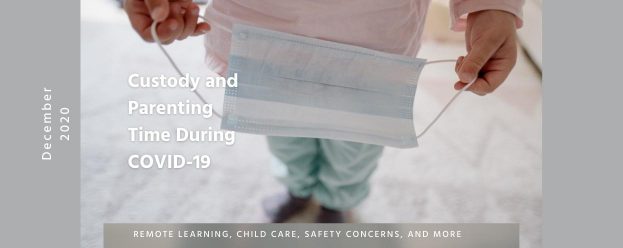23rd Dec 2020

Estimated reading time: 5 minutes
This year has certainly been an unprecedented year with every aspect of our lives being affected and forever altered by the coronavirus pandemic. As the schools cope with how to deal with ensuring safe and effective learning throughout the pandemic, divorced parents are also facing novel issues in co-parenting and school choice issues. Mandates to self-quarantine have also posed issues for divorced parents. Since the coronavirus crisis is also a new issue for the courts, attorneys are stepping into uncharted territory in advising their clients as to how a particular dispute that is COVID-19 related may play out in court. Below are some issues that seem to be arising as a result of the response to COVID-19.
Remote Learning and Child Care
Each school system has prepared a different response to how it will conduct learning through the pandemic. It appears that most school systems have introduced remote learning, if not for all of the curriculum, for at least part of the curriculum. One of the issues this has caused for some divorced parents is the expense of child care while the children are learning remotely if one of the parents cannot work remotely. Divorced parents who are ordered to equally share parenting time are now faced with having to pay for child care during the school day while their school age children learn remotely during their parenting time if the parent cannot work remotely.
While child care is normally a shared expense if incurred for a child under the age of 12 and is necessary due to the parent’s employment, when one of the parents can work remotely and the other cannot, he or she insists that the children should stay with him or her and avoid the child care expense. However, should the remote working parent have the children every day of the week for their remote learning, it would essentially shift a shared parenting time schedule to one that is solely to the parent who can work remotely. The parent who cannot work remotely should not have to sacrifice time that is legally awarded to them because they cannot work remotely. Working parents in this scenario should insist that their child care expense be equally shared by the remote working parent and maintain the parenting time as is ordered by the court.
COVID-19 Safety Concerns
Each parent has their own comfort level regarding how their children should stay safe during the pandemic. One parent may not particularly heed CDC or state health guidelines regarding mask wearing, quarantine, and avoiding group gatherings, while the other may not even be ordering take-out from a restaurant for fear of contracting the virus.
When divorced parents with two very different comfort levels are sharing legal decisions regarding their child or children, which approach is utilized? Generally, the parent exercising parenting time makes the rules during their parenting time, but if one of the parents feels that the other parent is making dangerous decisions and taking unnecessary and unreasonable risks with the child’s health, that parent may want to get the court involved.
Joint legal custodians have to agree on any decision that affects the health, education, and welfare of the child. A pandemic as the world has endured this year certainly falls under that category. When joint custodians cannot agree, the court must step in and decide what is reasonable under the circumstances. In these situations, the court would rely on expert advice as to what is a reasonable and an unreasonable risk to take during the pandemic. If the dispute is as to whether or not the children should engage in remote or in-person learning, it might be a more complicated decision for the court to make. The court would then likely need to balance the actual safety risks of the program of a particular school involved, the age of the child, the learning needs of the child, and sometimes the child’s own preference if the child is old enough to express a preference.
Quarantine
This is a word that we are hearing very often these days. A suggestion, and sometimes a mandate, to quarantine for work or school, is woven into the daily fabric of our lives due to the pandemic. Divorced parents want direction regarding parenting time if either of them need to quarantine. Do the children continue to be exchanged as usual during one of the parent’s quarantine? If not, which parent do the children stay with for 14 days? It is advisable that the divorced parents work this out on their own if the situation is immediately upon them. If the parents have very different opinions on how quarantine should be handled, it is appropriate to ask the court for guidance by filing a motion. The court will likely do a balancing rest regarding the particular facts of each situation before determining the plan going forward regarding quarantine.

When the stay home, stay in place orders were in effect, the clear direction of the court was that parenting time exchanges would continue as usual. A mandatory quarantine for one or the other parent presents a different safety risk. It is likely that the court would lean towards the parent not needing to quarantine to be in possession of the children for the duration of the other parent’s quarantine, with make-up parenting time being awarded to the quarantined parent when the quarantine is lifted. If the child needs to be quarantined, however, outside of special circumstances, the parenting time exchanges may be allowed to continue as it normally would, provided it is in the best interests of the child.
As we all try our best to navigate through a very different landscape in our lives, challenges in co-parenting after divorce can become all the more frustrating and divisive. However, it is important for joint custodians to attempt to resolve these conflicts if they can, prior to requesting court involvement which can take a long time and can be aggravating in and of itself.
Someday these times of coronavirus will end, and hopefully we will all have taken away something positive from the experience, even if we just learn to be more cooperative with one another.
Written by Monica Rossi Baylis


